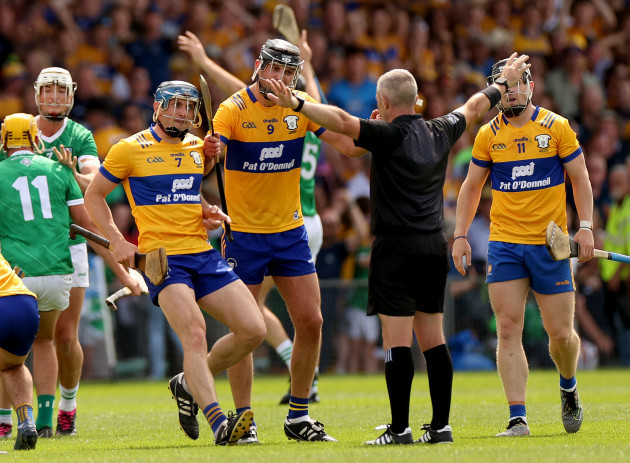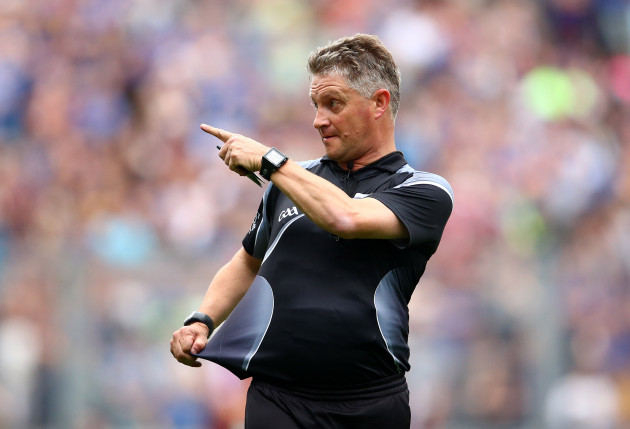ANYONE WHO HAS refereed a game I’ve played could well have looked at the headline and asked themselves if I’m having a laugh. This fella? Commenting on officials? He has more front than the Cusack Stand.
I’ll admit, the content and tone of what I’ve said to to them is not something I’d stand over here. Nor can I explain it away as the misadventures of youth. I’m probably every bit as irritating as a selector.
The temperature rises during competition and I sometimes behave in a way that’s not reasonable. If I have any redeeming quality, it’s that once the game is a result I’ll leave there. You won’t see me tweeting in anger about an official, or drawing a line from his eyes to the offence, asking HOW DID HE NOT SEE THAT!?
Once the adrenaline levels have returned so somewhere around their typical level you are left with the knowledge that theirs is the impossible job. Who in their sober mind would want to be a referee?
There’s a covered stand next to the pitch in Kanturk and the regulars know not to position themselves to the left of the structure. Go there and you’re asked to step in as an umpire. All you’ll hear is: “No, sorry, I have to leave at half-time.”
Next man: “I’m gone at half-time too!”
On it goes. Kanturk – the only place where people come to watch 30 minutes of hurling.
I was conscripted once to umpire a kids game. The ball went high over a post. I wasn’t sure if it was over or not, and called it a point. My stress levels were up around the same level as the fella who was at the controls of Hawk-Eye when it malfunctioned. There’s no joy in this, I told myself.
Those that do it in front of a crowd of thousands and an infinite supply of social media judges have my admiration, even if I haven’t always spoken to them in that manner.
Liam Gordon was escorted from the pitch on Sunday as a precaution against angry Clare fans getting to him. At half-time he was jeered to the roof by Limerick supporters. He’s the one guy on the field who cannot win.
Unreasonable doesn’t even begin to describe what’s asked of him. The pitch is longer than 140m, more than 80m wide. The ball moves at speeds over 100kph. It can travel 90 metres with one strike. There are numerous tussles going on at a given moment, most highly physical, some of them even involve the ball. Nearly everybody on the pitch is trying to test or at least influence you. The outside noise from beyond the field is, at best, distracting. Then there’s the matter of the rules.
We’ll know Artificial Intelligence has truly arrived when there’s a bot that knows every rule and can spot the infringement as it happens. But even then the human element remains key – you have to know where and when to overlook infractions. Because if you don’t the game is stop-start to a maddening degree.
But then what’s a minor infraction compared to a middling one? Can you spot one at 100mph with a load of other things going on? What if you get the sense that in the desire to “let it flow” that you have unintentionally given an edge to one side over the other?
You think you better let one go the other way. Next thing you’re a star of the digital age, a piece of content keeping servers hopping from China to the Dublin docks. Well, you are for a few moments at least until the next outrage happens.
Did I think there were fouls on Tony Kelly and Adam Hogan at the end of Clare’s one-point loss to Limerick? Of course. Can I see how someone would make such a call in the heat of everything that’s going on? 100% I can.
Straight up, people need to lay off referees. It’s one thing to holler and shout during a match but when it’s done it’s done. Unless you’re a purveyor of perfection yourself then it’s time to stop, and, reluctant as I am to bring up history, I say that as somebody that would have an All-Ireland medal if Brian Gavin took a more literal interpretation of the time left in the 2013 final.
But that’s the nature of the thing, you have to allow a ref scope to use their judgement and accept that calls won’t always break your way.
The key to it is ensuring that referees are as best placed as possible to make the right decisions. What can be done to that end?
Refs should be looked after, and by that I mean more than expenses. There’s a whole professionalism argument that it would take more time to get into, but let’s look at the narrower context of referees.
When there are millions of euro being generated on the gates, it makes sense to invest in the best standard of referee training – and payment – for officiating. If the rate reflected the responsibility then you would have a greater chance of recruiting former inter-county players as poachers turned gamekeepers.
Every defender in the country, for example, knows Aaron Gillane is the most skilled exponent around at playing the hurley. If they’re not on the pitch shouting at umpires and refs they at home screaming at the telly. It’s tough for referees to spot that, though. Gillane is smart, and they’ve never been that defender with their hurley in his grip.
Not that refs, to be fair, haven’t been players. I remember being at the Super 11s in Boston and seeing Sean Cleere pucking around. “I love seeing a ref with a good touch,” Brian Hurley, our goalkeeping coach, said to me.
If the ref is not aloof from players it goes a long way. Barry Kelly used his personality and a bit of humour to manage a game. I remember Paudie Maher was roaring at him during a game with Tipp.
Kelly just turned around: “Hey, do you think this is my first game at Junior B?”
He’d de-escalated the situation with one quip; asserted authority but done it without going for the notebook or even giving Paudie a lecture.
Fergal Horgan is another fantastic ref, and a loss to the inter-county game. His background as a player probably helped him realise the benefit of explaining decisions on the field.
There are others who take a more dictatorial approach. One of their umpires shouted at me before to “watch the square” as I was pucking out the ball.
“Do you think I haven’t got enough pressure on me without you roaring at me as well?”
Our relationship did not improve thereafter, but I got on well with most umpires. This is more testament to their ability to roll with the punches than my restraint. I’d be constantly on their case. “Look at that there, are you going to do anything about it? Say it to him! What’s the point in you being miced up if you’re just going to say nothing?”
Umpires and refs were usually well capable of a comeback, and over the seasons you’d get to know them. I don’t think the public know refs as well as they should. Some officials will talk in the media at times, which is good, but as a policy they don’t talk after a game and stand over their decisions.
It has been said they are not accountable as a result, which is not the case. They’re assessed to the enth degree now. I believe if they gave their reasoning for certain decisions and even occasionally put their hands up and said, “In real time I saw it like this and had to make a call” then the public would be more empathetic towards them.
People would realise that they’re not biased or incompetent, they’re just doing an impossible task for the sake of no reward beyond the knowledge that you’ve done all you could in the circumstances. The ultimate success is not a trophy on the front of the bus followed by a team holiday to Cancun, but the absence of vilification.
If we want a higher standard of referring then we need to move the conversation about how we’d bring that about – two refs on a pitch, more training for umpires and linesmen, whether payment is feasible – nothing should be beyond discussion.
Otherwise we can keep zeroing in individual mistakes and highlighting them for the edification of the scrolling hordes – an approach which could lead to even less people taking up the whistle when we need the opposite.



